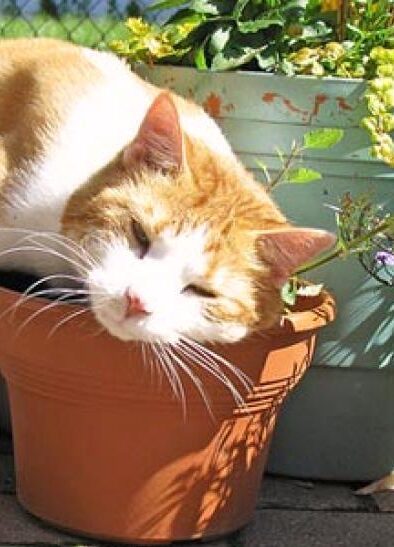Your cat’s mental health, happiness, and attitude can all improve by adding natural substances to their diet. The herbs on the following list are wonderful additions to your cat’s nutritious diet.
Catnip
Nepeta cataria or commonly called as Catnip is a seasonal perennial plant. Catnip has square-shaped stems and toothed leaves that are arranged in opposition. The plant quickly reproduces via seed as well as spikes of tiny white flowers with purple spots. Nepetalactone, a volatile oil found in catnip’s leaves and stems, stimulates sensory neurons in most cats and draws them to the plant. The effect typically lasts for around 10 minutes and causes a variety of behaviours, including as head scratching, drooling, jumping, and occasionally hostility.
Valerian Root
The herb known as valerian, or Valeriana officinalis, comes originally from Asia and Europe, but it has now spread to many other parts of the world, along with the United States and Canada. Valerian is a plant with roots, rhizomes, and stolons are used to create teas, oils, and dietary supplements including capsules and tablets. The actinidine in Phytochemicals of valerian root oil stimulates the brains of some cats when they are exposed to it. These cats will frequently start rolling around, playing, and acting agitated. They may drool as well. Because cats like to run, chase, and pounce after being exposed to valerian root, the playful feeling that appears to be induced by valerian root provides mental stimulation as well as exercise. Some cats who aren’t sensitive to catnip may react to valerian root.
Silver Vine
Actinidia polygama, sometimes known as silver vine, is a Himalayan plant that is indigenous to China, Japan, and Russia. It belongs to the Actinidiaceae family of plants, which includes the kiwi, and derives its name from the silver-white spots on its leaves. Flowers on the silver vine are white and cup-shaped. To stay happy, indoor cats require a range of stimulation. Similar to catnip, silver vine has a euphoric effect on cats. The effects only last up to 30 minutes after coming into contact with the silver vine. Sedation, hyperactivity, rolling, and licking are common cat reactions to the smell of silver vine. Nepetalactol, one of the silver vine’s active components, stimulates the reward and pleasure zones of cats’ brains.

